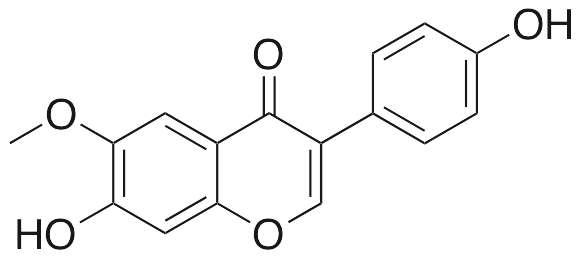Description
Glycitein is an aglycone isoflavone found in soy and red clover; it exhibits a wide variety of beneficial properties, including neuroprotective, antioxidative, anticancer, anti-osteoporotic, and anti-atherosclerotic activities. This compound also acts as a phytoestrogen. Glycitein inhibits generation of ROS, increases expression of heme oxygenase-1 (HO-1) and NADPH quinone reductase, and increases Nrf2-related antioxidative signaling. In vitro, glycitein downregulates expression of matrix metalloproteinases 3 and 9, preventing invasion of glioma cells. Additionally, this compound increases ERK1/2 activity and decreases cell proliferation in prostate cells. In aortic smooth muscle cells, glycitein inhibits DNA synthesis and cell proliferation, attenuating a pathology that occurs in atherosclerosis. In cellular models of Alzheimer’s disease, glycitein also binds to amyloid-β (Aβ) monomers, oligomers, and fibrils, destabilizing Aβ aggregates and preventing fibril assembly. Glycitein also affects bone formation, inhibiting osteoclast generation and decreasing expression of IL-6 and RANKL in bone marrow-derived osteoclasts.
